When it comes to cooling your home during Canada’s hot summers—and possibly heating it during the frigid winters—two popular options typically come up: heat pumps and air conditioning units. But how do they compare in terms of efficiency, cost, and long-term value?
As a smart homeowner, you want to keep the temperature in your home comfortable without paying too much for your energy use. Every home is different, so the right solution for heating and cooling is not always simple.
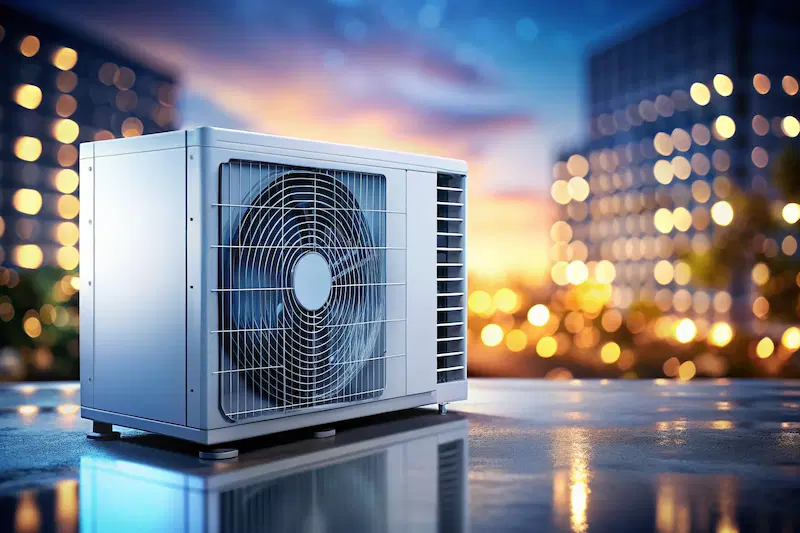
Understanding your needs and your options can help you to create a more comfortable home while reducing your heating and cooling bills.
Let’s break down the pros and cons of each, along with what you can expect to pay if you’re living in Canada.
What’s the Difference between Heat Pumps and Air Conditioners?
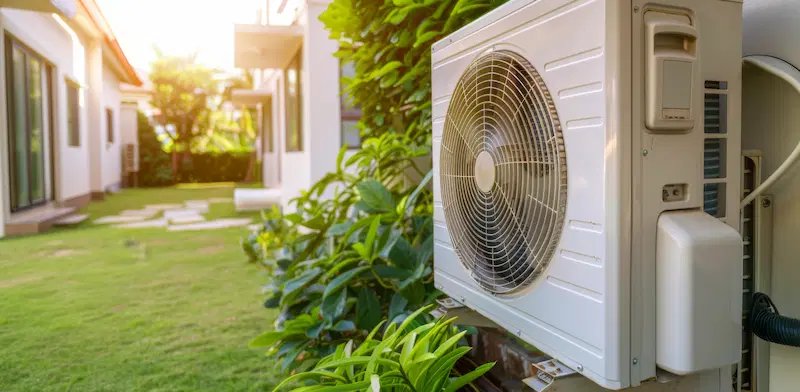
Heat pumps and air conditioning units are widely-used in Canada, where weather conditions are harsh. Homes are equipped with HVAC systems that provide warm temperatures in winter and cool temperatures in summer.
How do heat pumps and air conditioners work? Let’s examine each one and compare them based on function, price, and energy efficiency.
Air Conditioners (ACs) cool indoor spaces by extracting heat and humidity in the air. This is what they are designed for, and they do the job well.
Heat Pumps, on the other hand, perform in two ways. During summer, they cool your home just like an air conditioner. In winter, they do the opposite, drawing heat from the outside air and bringing it indoors, even in sub-zero temperatures.
Making the choice to keep your heating and cooling systems separate or switching to a heat pump is all up to you.
Learn more about the pros and cons of heat pumps and air conditioners to guide you in making your decision.
The Pros and Cons of Heat Pumps vs Air Conditioning Units
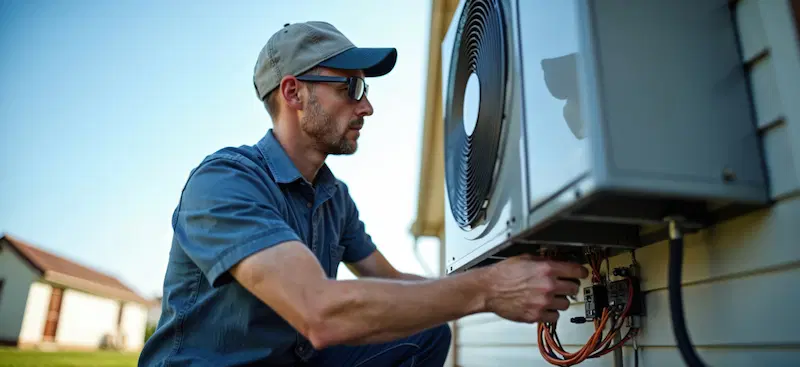
We know you want to get to the nitty-gritty so you can finally pick the right system for your home. This means you have to do a serious comparison of their pros and cons.
We have presented all the details you will want to know for heat pumps and air conditioning units.
The huge benefits of installing a heat pump include:
- Two-Way System: Cools during summer and heats during winter. You will need only one system to heat and cool all-year-round.
- Energy-Efficient: They are more efficient than electric furnaces or baseboard heaters.
- Environmentally-Friendly: Emit lower greenhouse gas emissions if powered by clean electricity.
- Government Rebates: Qualified for several federal and provincial incentives (like the Canada Greener Homes Grant).
- Heat pumps are more expensive to install than an air conditioning unit.
- Less efficient in very low temperatures (although new models include cold-climate heat pumps that perform much better).
- Often need to be paired with a secondary heating source in colder provinces.
- Cheaper than a heat pump system.
- Focused purely on cooling, making it simple to operate and maintain.
- Can be paired with existing gas or electric furnaces.
- Cheaper than a heat pump system.
- Focused purely on cooling, making it simple to operate and maintain.
- Can be paired with existing gas or electric furnaces.
You have now seen the pros and cons of heat pumps vs. air conditioning units. You can now compare the costs to help you make a well-informed decision.
Price Comparison of Heat Pumps & Air Conditioning Units

Before investing in a new home comfort system, it’s important to understand what you’re paying for, not just upfront, but over the long term.
Heat pumps and air conditioners differ dramatically in cost, installation requirements, and potential energy savings. The chart below presents an approximate breakdown of what to expect from each type of equipment, including installation costs, lifespan, and possible rebates.
Please remember that actual costs may differ depending on your province, home size, and specific needs.
System Type |
Average Installation Cost |
Lifespan |
Potential Rebates |
Heat Pump |
$8,000 – $15,000 |
15 to 20 years |
Up to $6,500 |
Mini-split heat pump |
$3,000 – $7,000 (per zone) |
12 to 15 years |
Vary per province |
Central air conditioner |
$3,500 – $8,000 |
12 to 15 years |
None |
The costs of installation varies based on location, size of the home, brand and model, type of system, and other factors.
Which One Is Right for You – Heat Pump or Air Conditioner?
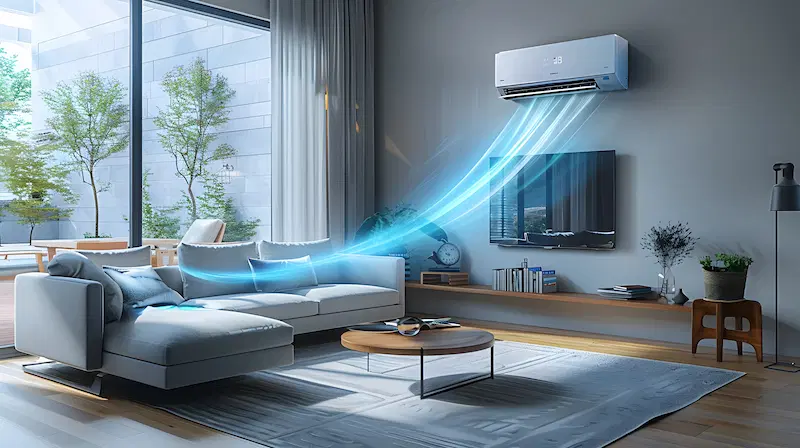
Select a Heat Pump if you want a two-way system and wish to reduce your monthly energy bills. You will get a super machine that does double duty from January to December.
Select an air conditioning system if you already use a good furnace, reside in an area with less severe winters, and can only upgrade on a small budget.
Although the upfront cost of a heat pump installation can seem daunting, it is critical to consider the overall cost of owning one.
The government offers many incentives to homeowners who do upgrades on energy efficiency, making this switch more affordable and cost-effective.
Get at least 3 quotes from reputable HVAC contractors today using our short online form at no cost.
When is the best time to switch to a Heat Pump?
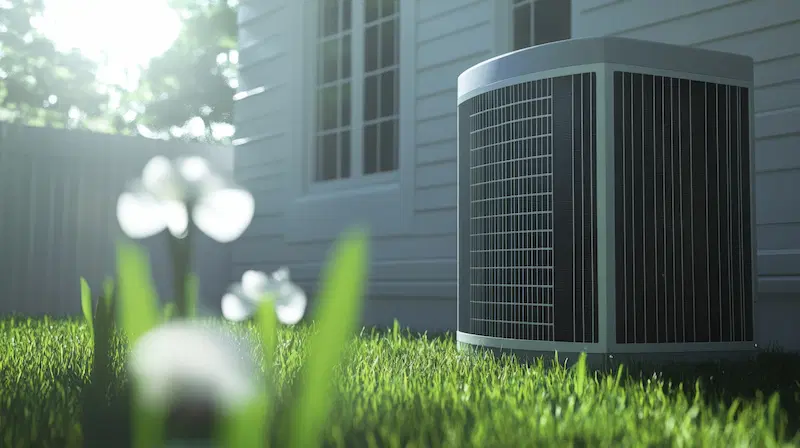
The best time to make the switch to a heat pump is from April to June (spring) or September to October (fall). Here’s why this is the best time to do so.
1. Installation Discounts
HVAC contractors are less busy around these times and can offer promotional discounts. With more availability, you also have more companies to choose from and get the schedule you want.
2. Ideal Weather Conditions
Spring and fall have mild temperatures so your home won’t suffer from insufficient heating or cooling during installation. Your comfort level won’t be compromised while the old system is being replaced.
3. Be the first before contractors get busy.
Summer and winter are busy times for HVAC contractors due to high volume of repairs and installations. Upgrade during off-season to avoid long wait times, price increases, and high emergency repair costs.
4. Benefit from potential rebates.
Several government rebate programs such as the Oil to Heat Pump Affordability Program are on a first-come, first-served basis.
You can get ahead and secure your funding by applying in spring before the annual budget is exhausted.
Cold-Climate Heat Pumps & How They Work
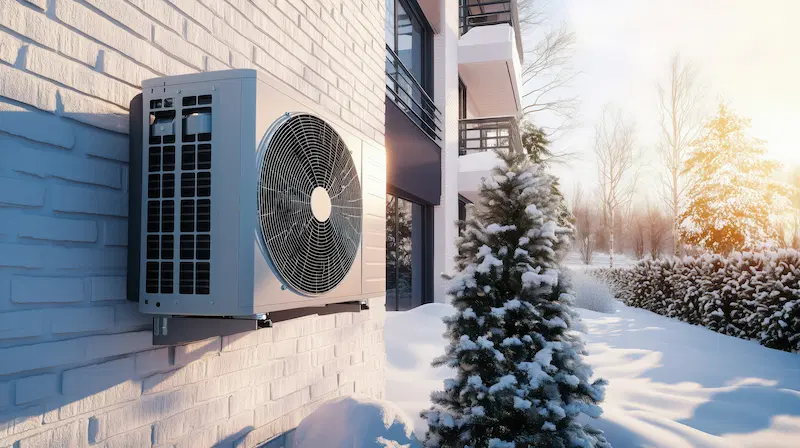
One of the biggest concerns of Canadian homeowners about upgrading to a heat pump is the ability of a heat pump to work when winter temperatures are extreme.
Cold Climate Heat Pumps are especially engineered to perform effectively in below -20°C temperatures.
How are Cold-climate heat pumps different?
Cold-climate heat pumps use the following:
- Advanced inverter-driven compressors that adjust performance based on demand.
- Enhanced refrigerant cycles that allow them to extract heat from very cold air.
- Variable-speed motors to maintain comfort without frequent cycling on and off.
These design upgrades make Cold-Climate Heat Pumps (CCHPs) a lot more effective than conventional heat pumps in areas that experience harsh winters like Quebec, Ontario, and Atlantic Canada.
They are reliable even in sub-zero conditions, especially models that are listed as Canada Greener Homes eligible. They can provide 75% or more of your heating needs up to –25°C.
Although these systems are very capable, some homeowners in really cold provinces maintain a backup heating source such as a gas furnace to ensure sufficient heat in the home.
Due to their lower environmental impact and energy efficiency, cold climate heat pumps are eligible for provincial and federal rebates.
Which system is best based on type of home?
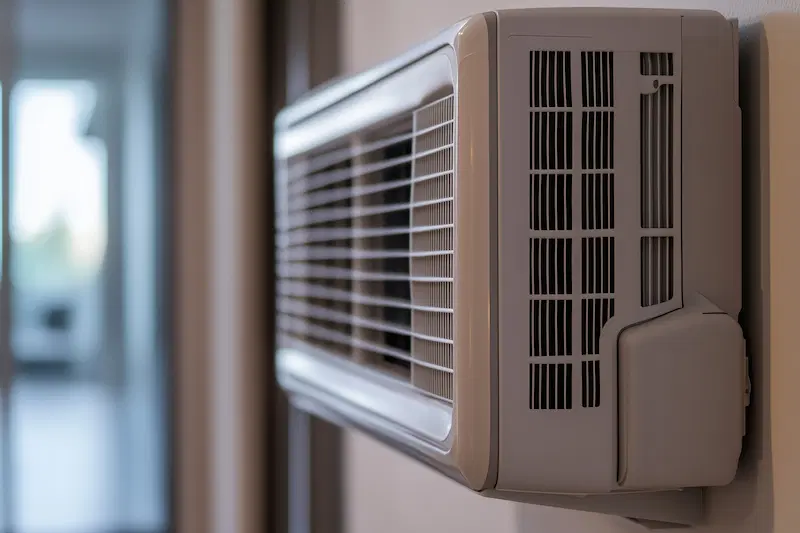
Choosing between a heat pump and a traditional air conditioning unit depends on the type of home you live in.
Your home’s size, layout, insulation, and existing heating system all have an impact on which solution will be most cost-effective and efficient. There is no one-size-fits-all solution!
Below you will find a practical and easy-to-understand guide in determining which type of system is best for your home.
Detached or Single-Family Homes
Ideal: Cold climate heat pump (ducted or ductless)
- These homes often have enough space for both indoor and outdoor units.
- If the home has existing ductwork, a central (ducted) heat pump is ideal.
- If not, a ductless mini-split works great and avoids costly renovations.
Condos and Apartments
Ideal: Mini-split heat pump or standard Air conditioning unit
- Mini-splits are compact and don’t need full duct systems, making them more suitable due to limited outdoor space.
Older Homes (Without Ductwork)
Ideal: Ductless heat pump (mini-split)
- Ductwork is expensive and invasive.
- Mini-split systems offer efficient heating and cooling with no major structural changes required.
- Each room can have its own temperature setting.
Rural or Isolated Homes
Ideal: Cold climate heat pump + backup electric or wood heating
- Heat pumps are ideal when natural gas is not available.
New Builds or Major Renovations
Ideal: Cold climate heat pump
- CCHPs are perfect for new construction as they can be fully integrated into the home from the start.
- Ducting or multi-zone units will mean seamless comfort.
Regardless of the type of home you live in, you can always get expert advice from an HVAC contractor from our network and take advantage of available rebates.
Please fill out the short online form on this page to receive FREE and NO-OBLIGATION QUOTES!
Installation Process: Timeline for a heat pump vs. an air conditioning unit
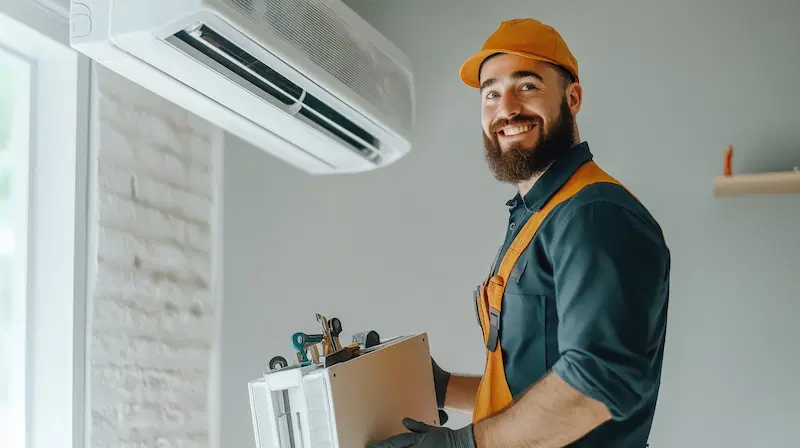
Whether you plan on a heat pump installation or an air conditioning unit, it pays to know what to expect so you can avoid surprises.
Both systems are similar in some ways, but a heat pump installation is more involved, especially if integration of heating is needed.
Timeline: Heat Pump vs. AC Installation
| Type of System | Average Installation Time |
| Central air conditioning | 1-2 days |
| Ducted Heat Pump | 2-3 days |
| Mini-split Heat Pump | 1-2 days per unit Longer for multi-zone units |
Please take note that the installation time depends on the size of your home and whether electrical upgrades or ductwork is required.
You should check with your selected HVAC contractor on the timeline for your installation so you can be prepared.
Make the Right Choice: Compare multiple quotes from reliable HVAC contractors

Choosing between a heat pump and a traditional air conditioning unit comes down to more than just cooling your home—it’s about finding the best system that improves your comfort, energy goals, and budget.
If you’re looking for year-round comfort, better energy efficiency, and long-term savings, a cold climate heat pump is a great investment, especially with generous rebates that are currently available across the country.
If you already have a good heating system and only want cooling, a standard air conditioning unit can be good in the short term at a lower cost.
With smart planning today, you can enjoy greater comfort—and lower bills—for many years.
Ready to find out which system is right for your home and your budget? Fill out our short online form and get FREE QUOTES from trusted HVAC professionals in your area.



